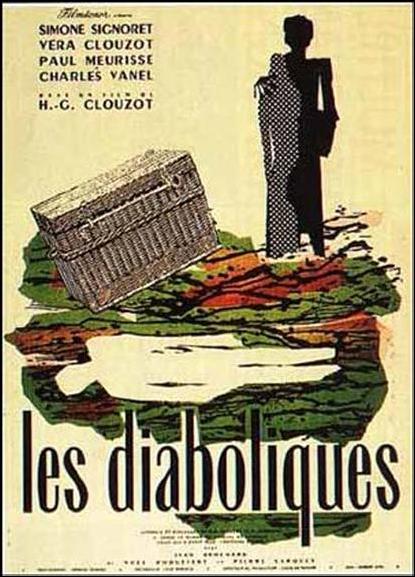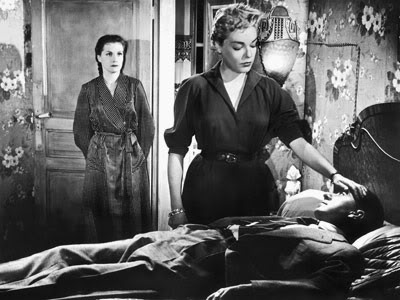
There are two scenarios that make collecting Criterion Blu-rays so incredibly rewarding. The first is when Criterion tenders amazing releases to movies you’ve never seen before. Much like the situation I found myself in with Brian DePalma’s Blow Out, there is nothing quite like discovering a film for the first time on Criterion Blu; few things are more cinematically idyllic. That being said, the scenario I prefer, and what has sent me sprinting back to acquire entries into the Criterion Collection again and again, is when it releases a film with which I am totally and relentlessly in love. Such a moment occurred last week when Clouzot’s Diabolique was released on Blu-ray.
 As much as I dislike French New Wave, in terms of genre films, France has produced some of my absolute favorites. My first experience with this — or any French film for that matter — occurred in my freshman year of high school. The teacher of my French class, clearly desiring to take a de facto two-day vacation, decided that we would all sit down and watch an old black-and-white horror film from director Henri-Georges Clouzot. I was instantly awestruck by what unfolded before me, what ultimately became a frequently revisited film around my domicile. This may sound like a self-indulgent anecdote, but it turns out there was a very specific reason for my instant connection with this film that was only brought to my attention after delving into the special features on this Criterion Blu.
As much as I dislike French New Wave, in terms of genre films, France has produced some of my absolute favorites. My first experience with this — or any French film for that matter — occurred in my freshman year of high school. The teacher of my French class, clearly desiring to take a de facto two-day vacation, decided that we would all sit down and watch an old black-and-white horror film from director Henri-Georges Clouzot. I was instantly awestruck by what unfolded before me, what ultimately became a frequently revisited film around my domicile. This may sound like a self-indulgent anecdote, but it turns out there was a very specific reason for my instant connection with this film that was only brought to my attention after delving into the special features on this Criterion Blu.
More on this revelation in a moment, but first, to the film itself.
Diabolique is the story of a private boy’s school run by a woman and her husband. When I say husband, what I really mean is the rancid excuse for a human being to whom our heroine happens to be wed. This man delights in physically, sexually and psychologically torturing his fragile, weak-hearted wife. Eventually, his regimen of abuse becomes too much for her to bear. She and another teacher at the school, with whom the husband has had an affair, conspire to exorcise themselves of him once and for all. Having accomplished the deed, they believe they are home free. But a series of supernatural events leads the two to suspect that somehow the husband is still tormenting them from beyond the grave.
Few modern horror films are able to match the power and unsettling effectiveness of Diabolique. The film is shot as if it were a gothic horror movie, and yet its setting is one of timeless foreboding. There have been countless films that have explored the frightfulness of private schools, and Diabolique stands shoulder to shoulder with some of the best — The Devil’s Backbone and The Orphanage leaping immediately to mind. Diabolique similarly investigates the discord between these schools as havens, places of safety, as well as arenas for supernatural dangers. Diabolique’s cinematography (featuring masterful use of shadow and light) and its subtlety (always suggesting but rarely revealing) provide a more gothic tone and allow for a truly unique and terrifying experience.
 Though not as loaded to the gills with special features as some of the other Criterion Blu-ray releases, Diabolique harbors one particular interview that was not only fascinating, but shed new light on my initial appreciation of the film as well as strengthened my currently thriving adoration. The interview is with a British film critic and novelist named Kim Newman. I was actually very happy to see him turn up here, as he was my favorite part of an extensive documentary about England’s Video Nasties and the corresponding censorship issue. Kim’s knowledge of truly schlocky exploitation fare was rivaled only by his wit and ability to perfectly and eloquently summarize any given film. On this special feature, Kim proves that his knowledge is not limited to cheesy horror, and he waxes poetic about the merits of Diabolique as well as a connection to Alfred Hitchcock, of which I was previously unaware.
Though not as loaded to the gills with special features as some of the other Criterion Blu-ray releases, Diabolique harbors one particular interview that was not only fascinating, but shed new light on my initial appreciation of the film as well as strengthened my currently thriving adoration. The interview is with a British film critic and novelist named Kim Newman. I was actually very happy to see him turn up here, as he was my favorite part of an extensive documentary about England’s Video Nasties and the corresponding censorship issue. Kim’s knowledge of truly schlocky exploitation fare was rivaled only by his wit and ability to perfectly and eloquently summarize any given film. On this special feature, Kim proves that his knowledge is not limited to cheesy horror, and he waxes poetic about the merits of Diabolique as well as a connection to Alfred Hitchcock, of which I was previously unaware.
I know I tend to make a habit of bringing up Hitch whenever possible, because this is a man who fundamentally altered the course of my film geekdom and ultimately my life. But what I didn’t know is that Hitch, for a brief time, considered Clouzot to be his rival. Hitchcock was never coy about his mantra as the Master of Suspense, and when Clouzot’s 1955 film Wages of Fear, about two men transporting nitroglycerin cross country, was touted as the most suspenseful movie of all time, he was a bit put off. But what really got Hitch’s goat was when Clouzot beat him out for the rights to adapt a story by Thomas Narcejac and Pierre Boileau, a story that ultimately became Diabolique and was a monster success for Clouzot. In response, Hitch snatched up another novel by those same writers that then became his Vertigo. There is also a rumor that Hitch latched on to the idea of adapting Psycho when he heard about the shower scene, which he hoped would dwarf the seminal bathtub scene at the end of Diabolique.
Even though Diabolique is a film with which I was already quite familiar, Criterion has engendered a completely new appreciation for it within me. Learning of the connections between Hitch and Clouzot, how each inspired the other to push further and further, was like a thunderclap in my brain. It would easily explain why that dorky high school kid, who was just discovering the greatness of Hitchcock, took such a shine to this weird little French horror flick. Thanks, Criterion!


